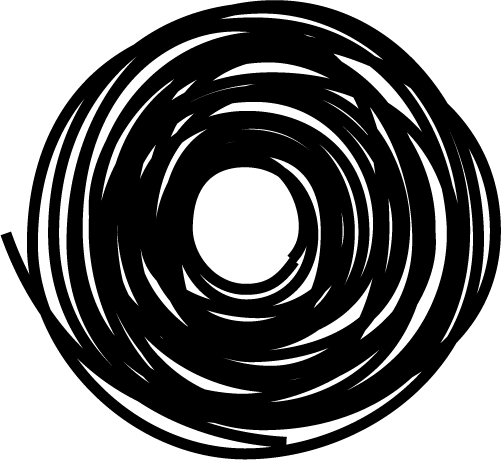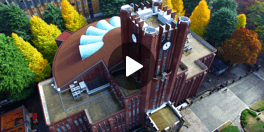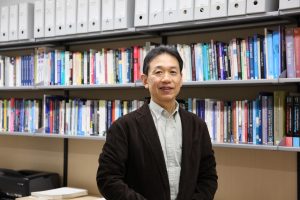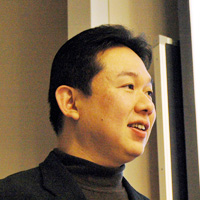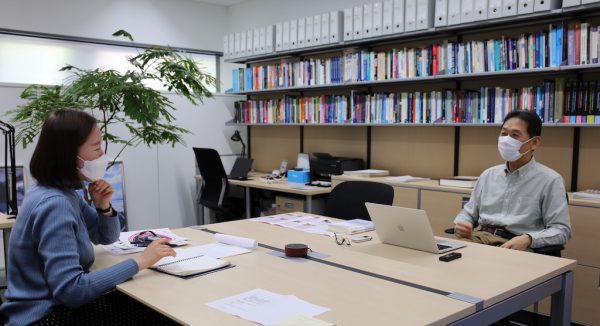
April 30, 2021
【教員インタビュー】山内祐平教授(後編)Interview with Professor YAMAUCHI, Yuhei (Part2)
ここからがまさに学環・学府の出番
ー新しい研究領域を育てるための種蒔きが課題にー
2021年4月に新学環長・学府長へ就任された山内先生にお話を伺いました。パンデミックとご専門の学習環境デザインについて、また21年目に突入する学環・学府の今後の課題と目標について語っていただきました。(前編はこちら)
(English translation follows. Part 1 can be read here.)
ー 山内先生といえば学環コモンズをつくられた方ですね。
学環コモンズは24時間365日、居場所としていつでも来て友人や教員と話せるスペースとして大切に守ってきました。しかし、2020年4月からの緊急事態宣言の時は完全にキャンパスが閉鎖されたので使用停止にせざるを得なかった。学環コモンズができて以来初めてのことで、私としても内心忸怩たるものがありました。今は感染対策をした上で使えますので、ぜひコモンズを活用してオンラインだけではできない深いつながりを作ってもらえるとうれしいです。
2018年にコモンズのリ・デザインを行いました。コモンズを使っている院生や教育部研究生とワークショップでプランニングし、彼らのこういう空間にしたい、という要望を大事にしつつ、サードプレイス的な居場所としてアップデートしました。窓際のひとりがけソファーも、その時に新たに配置したものです。コモンズはもともと、授業の合間にグループで学習する活動をイメージしていましたが、最近はタブレットを1人でブラウズしている人も多いんですよね。タブレットを見るのだったら、机と椅子ではないなと思い、家具をご寄付いただいたコクヨさんとご相談して選びました。1人で落ち着いて考えることと、集団でひろげていくことの往復も意識しています。
ー コモンズの前を通りかかる方から、中でなにしてるんだろうなあって覗かれますよね。
そうそう。一種の、人間ショーケース(笑)。むしろアピールしてほしいんですよね、私たちは楽しく学んでいるんだよっていうことを。これは建築家の安藤忠雄さんの思いでもあります。実際に教育部研究生を志望する学生の中には、コモンズで学んでみたいということがけっこうあるみたいですね。コミュニティに参画するきっかけになりますので、ぜひ楽しそうに学んでいただければと思います(笑)。
ー 昨年、学環は20周年を迎えました。21年目からの学環長として、これからの課題、目標をお伺いしたいと思います。
創立20周年の年であった昨年、情報学環は将来計画を立てました。今後学環・学府をどう発展させていくかという計画です。
学環・学府は、「情報社会と人間」に関する学際的な研究と教育を20年間進め、実績をあげてきました。研究領域でいうと、情報と社会基盤・戦略、情報と倫理・文化、情報とアート・デザイン、情報と防災コミュニケーションという4本の柱を立ち上げてきたわけです。今後20年間のさらなる発展のためには、この柱をもっと増やしていく必要があります。育った4本の木はしっかり育てていきつつ、また新しい木を植えていく。学環長の任期3年で私がやることは、新しいプロジェクトの種蒔きをすることだと思っています。
これからの情報学環のミッションは「未来情報社会の価値を創造する新学術領域の創成と人材育成」です。20年後の社会の底上げにつながるような価値創造と無形資産を蓄積するために、多様性と包摂性を大事にしながら活動を展開していきます。そして、問題が発生したときに新たな価値を創造できるような人材を育てることで社会還元をしていく。
過去の歴史・現在の状況・未来の可能性について、50年ぐらいの時系列をみすえて研究すべきことを考え、学環・学府の多様な専門性を持った人たちが知恵をしぼることによって、オリジナルな研究を形にしていくことが大事だと思います。もちろん、我々のみでやるのではなく、社会と密接につながりながら。企業や学校、自治体やNPOなど、パートナーはいろいろ考えられます。仲間とともに、長期的かつ俯瞰的な視座をもって課題にとりくむ研究プロジェクトを立ち上げていくことが学環として重要であり、学環長として取り組みたいと考えています。
ー 将来計画を策定された中で、改めて学府の学生に期待されることはなんでしょうか?
コロナ禍なのでやりにくいところもあると思いますが、自分の専門と違う人たちの知り合いを作ってください。創造的活動においては人的ネットワークが非常に重要です。違う領域の人と話をしていると「その領域でそんな考え方をするのなら、うちの領域でもこうできるんじゃないか」というヒントがもらえたりしますからね。専門が遠い人じゃなくても、隣接する領域の人でもいい。自分の研究室に閉じこもるのではなく、専門とは違う授業を取りにいってみるとか。勉強会や研究会も、コモンズを活用してもらって。そういうところからはじめて、もしなにか新しくて面白いテーマを思いついたら、新たな研究プロジェクトを学生同士でやってみることもできるでしょうし、ベンチャービジネスでスピンアウトしてやっていく可能性もあるでしょう。研究室はホームグラウンドなので大事にしてもらいたいと思いますが、せっかく多様性のある組織である学環・学府にきているので、ちょっと一歩勇気をふるって、専門が違う人たちと話をしてみてはいかがでしょうか。
ー 多様な学府の院生も、論文が書けないという共通の悩みを持っています。学習環境デザインの専門家として、学習環境をこうしたら論文が書けるよ、と一言でアドバイスをいただけるとありがたいです。
論文をたくさん書いてきた人に見てもらって、論文を書く方法についてアドバイスしてもらうことだと思いますね。論文は一人では書けるようにはならない。コミュニティの中でどうやって書いたら良いかを学び取る、そのための場がまさにゼミなんですね。そういう意味では教員が重要な役割を持つわけですが。
論文でまず大事なのはリサーチ・クエスチョンですよね。問題をどう設定するかがわかればもう半分できたようなものです。でもそれが難しくて、レビューすればするほど問題がわからなくなったりします。論文が書ける人はどういう目で先行研究を見て、どうやって問題を見つけていくのか、その視点をシェアしてもらう。
だからこそみんなが集まって大学院という学びの場を作っている。論文を書くことは、社会的な営みなのです。
ー 最後に学府の学生へのメッセージをお願いします。
コロナによって、「情報」が未来社会の基盤なんだということを全世界の人々が理解したと思います。ここから先はまさに学環・学府の出番です。いまDXが流行り言葉になっていますが、よりよい人と社会の繋がりのために情報をどう使うかというのは我々の専門ですし、これほど求められる時代はなかった。まさにこれからが正念場だと思っています。
学際情報学府は、情報社会と人間に関して、情報の観点だけではなくプラスアルファの複眼で見れる人たちを、育ててきました。博士の学位を取った研究者だけでなく、社会で活躍している修了生たちもみんなそうだと思います。複眼的な視座から新しい情報社会の形を構想できる人はこれからまさに活躍が期待されます。学環・学府のネットワークの中で学びを深め、人々が幸せに生きられる情報社会のためにともに力を尽くしましょう。
企画:ウェブサイト&ニューズレター編集部
取材・構成:金佳榮(特任研究員)・神谷説子(特任助教)
英訳:デービッド・ビュースト(特任専門員)
The III/GSII’s time has now come:
New Dean envisions establishing the foundations for various new projects
We conducted an interview with Prof. Yuhei Yamauchi, who became Dean of the III/GSII in April 2021. In addition to expressing his views about the future of the III/GSII, he also talked about the pandemic and his own research on designing learning environments. (Part 1 can be read here)
Q. You are known, aren’t you, as the person who created the III Commons.
I have tried to preserve the III Commons as a place where people can come and meet their friends or professors at any time of day or night and any day of the year. Unfortunately, however, we were forced to close the Commons from April 2020 for a while because the university closed down due to the pandemic – for the first time since the Commons was created, which touched my heart very deeply. With precautions against the spread of infection, it is now possible to use the Commons again, and I hope people will use it to build closer connections which cannot be achieved online.
In 2018, we redesigned the Commons. In response to requests from students who held a workshop to consider how to make better use of this space, we updated it to make it more like a “third place”. For example, we installed individual chairs close to the windows. Originally, we had thought of the Commons as a place where students will study in groups between classes, but recently many people can be seen using tablets on their own. If students are using tablets, we thought that desks and chairs would be less appropriate. So, after consulting with Kokuyo Co. Ltd., we arrived at this layout instead. There is a need for a place where people can do individual tasks and then return to the group. We were conscious of the importance of this.
Q. People passing by the Commons often peer inside to see what those inside are doing, don’t they?
Yes, yes. It’s almost like a human showcase. [laugh] I would like those inside the Commons to display to those outside how happily they are studying. That’s also the wish of Mr. Tadao Ando, the architect who designed the Fukutake Hall. Apparently, many of those applying for the Undergraduate Research Student Program are motivated by a desire to have access to the Commons and see what it is like to study there. This desire may then lead them to participate in our community, so I hope students will display their happiness while studying. [laugh]
Q. Last year was the twentieth anniversary year of the III/GSII. As Dean, could you tell us about the problems and aims to be tackled now that the III/GSII has entered its twenty-first year?
Last year, in the twentieth anniversary year, the III/GSII created a plan for the organization’s development in the next twenty years.
In its twenty years of development, the III/GSII has accumulated numerous fundamental research and educational achievements in a wide range of areas related to the “information society and human life”. We have established four main research pillars: “information, social infrastructure and strategy,” “information, ethics and culture,” “information, art and design,” and “information, disaster management and communication.” In the next twenty years, we must increase the number of these pillars, thus enhancing the richness and variety of our educational endeavors. One of my tasks as Dean in the next three years will be to establish the foundations for various new projects.
The III/GSII’s mission in the future will be to “create new areas of academic research and promote human resource development for the future information society.” Our aim is to create value and intangible heritage that will raise the standards for society twenty years from now. To do this, we must respect diversity and inclusion. Personnel equal to the task of tackling newly emerging problems are urgently needed. Our task is to educate people to fulfill this vital social role.
Rather than taking a short-term perspective, we must look ahead several decades when considering what to research. Thinking in terms of a fifty-year time scale, we must take into account past changes, the current situation and how things should develop in the future. I think it is very important for us to develop highly original projects and fields by including people with a very diverse range of specializations in the projects of the III/GSII. We should do this not only among ourselves, but also in close cooperation with the wider society. There are many potential partners in business corporations, schools, local governments and NPOs. In cooperation with such partners, it is important for the III/GSII to take a broader and more long-term perspective on contemporary problems and develop projects to find solutions to them. As Dean, this is my first goal.
Q. As you lay out plans for the III/GSII’s future, what do you expect of the students?
I understand this may be difficult during the pandemic, but I would like the students to develop acquaintances and have discussions with people outside their own fields of specialization. Developing such interdisciplinary relationships is very important because it puts students into contact with ideas they may have never heard before and provides fresh hints that could potentially be applied in their own research. Such cross-pollination can even happen through contact with neighboring fields. One of the most appealing features of the III/GSII is the presence of people with slightly different disciplinary perspectives. Instead of remaining closed off in their own laboratories, I hope that students with take classes outside their own immediate area and have broad discussions with their friends. I hope the III Commons will be used precisely for this purpose through study groups and research seminars. New ideas encountered in this way may even spark students to start new research projects among themselves. There may also be business spin-offs resulting from such student interaction. The laboratory is important as a home ground, but I hope students will be adventurous enough to step outside this familiar territory and initiate conversations with others.
Q. Despite their diversity, there is a common worry among graduate students that they cannot write research papers. As a specialist in the design of learning environments, do you have any advice to students about how they should approach paper writing?
If I were to offer one word of advice, it would be to absorb paper-writing techniques by associating with those who can already do it. In reality, it is impossible to learn paper-writing on one’s own. The place for such community learning is indeed the seminar. In this sense, students do not learn alone, and faculty have an important role.
Let us consider the fundamental question of what a research paper is. The most important thing is the research question. Identifying the question is already half of what it takes to write a paper. However, this can be quite difficult, and often when reviewing the literature, it is difficult to identify a research question. Students can learn techniques from those who can write papers by receiving advice on how they approach the literature and how they find problems. The whole purpose of having a graduate school where people come together is to build such community relations. Writing academic papers is a social activity.
Q. Finally, do you have a message for the students of the GSII?
As a result of the pandemic, I think the whole world now knows that the society of the future will be based on information. The III/GSII’s time has now come. DX has become a fashionable term, and we specialize in how to use information to create better social bonds between people. Never before has there been such a demand for this. This indeed is a crucial moment for us.
We have trained and sent out into the world many people who can look at society and human beings not only from the perspective of information but with something plus alpha. This is true not only of our Ph.D. graduates but also of all those now active in society. We live in an age when there is increasing demand for people with multiple perspectives on the information society. I hope you will deepen your studies here and join our endeavor of creating the information environment that society needs for people to live happily.
Interviewers: Kayoung Kim (Project researcher), Setsuko Kamiya (Project assistant professor)
Translation: David Buist (Project senior specialist)
主担当教員Associated Faculty Members
教授
山内 祐平
- 文化・人間情報学コース
- アジア情報社会コース
Professor
YAMAUCHI, Yuhei
- Cultural and human information studies course
- ITASIA Program
